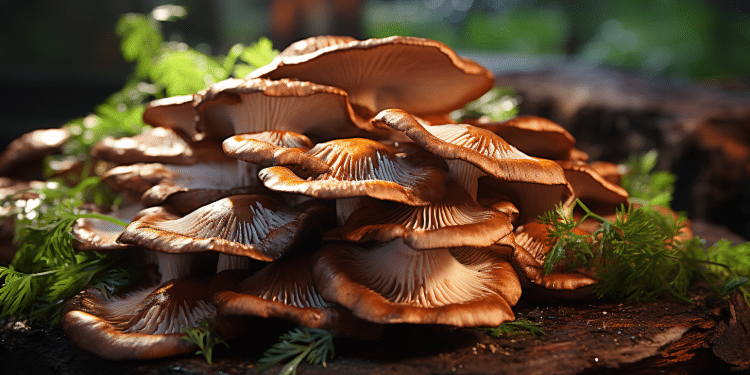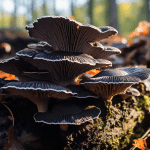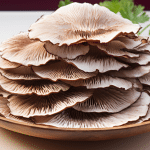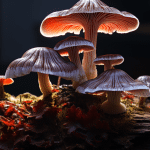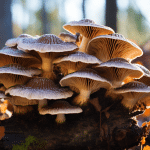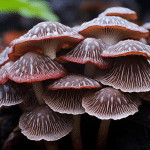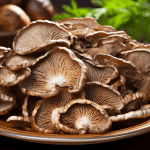Turkey Tail is one of the many mushrooms used in Asian medicine for centuries. Also known as Trametes versicolor or Coriolus versicolor, it got its moniker from the brightly colored patterns of colors it has, which look like, yeah, a turkey tail.
And though turkey tail mushrooms are said to offer a number of health benefits, one that stands out is its reputation for strengthening your immune system in order to fend off cancer. For centuries, people throughout Asia have turned to over 100 different species of mushrooms to try and stave off cancer. And some evidence suggests turkey tail mushrooms might have anti-cancer properties.
Why are turkey tail mushrooms so widely recommended for Cancer?
You may find one of these colorful mushrooms, which may look like a set of disks, growing from the side of a dead hardwood tree. They are fairly common across the U.S., and are fairly tough, too.
Why these fungi of many colors appear to have such promise? Turkey Tail Mushroom enthusiasts point out that there are numerous properties in these mushrooms that can benefit your immune system.
They Contain Antioxidants
For instance, turkey tail mushrooms are rich in antioxidants such as phenols. Antioxidants reduce or inhibit the damage to cells caused by oxidative stress, a condition caused when there is an imbalance between the antioxidants and reactive molecules called free radical molecules. And turkey tails are not only rich in antioxidants, they appear to contain numerous different types. In fact, one study from 2017 (1) found turkey tail mushrooms contain 35 different phenolic compounds.
They Have Polysaccharopeptides
They also contain polysacchariopeptides, including krestin (PSK) and polysaccharide peptide (PSP), which can help strengthen the immune system of the body. As you will see, that is part of the reason why so many people are intrigued by the potential cancer-fighting role of this mushroom.
What types of cancer does turkey tail mushroom help fight?
Researchers are continuing to explore the potential for using extracts or therapies derived from turkey-tail mushrooms to prevent or treat multiple types of cancer. Although some research findings are promising, turkey tail cannot substitute for cancer drugs. They should be used by those who have cancer only when recommended to do so by their cancer doctor.
1. Leukemia
While further studies are needed, a 2013 in vitro study published in 2013 showed promise for using a Turkey Tail Mushroom extract to treat leukemia. Researchers studied the effects of extract taken from the Trametes versicolor mushrooms on treating leukemia cells.
They compared using it on its own with the combination of Trametes versicolor and Ganoderma lucidum, or Reishi mushrooms. The researchers found that the combination was more powerful than Trametes versicolor alone. They believe that may be because the two different mushrooms affected different biological processes.
This combination could be beneficial to cancer patients at a larger scale. In one 2019 study (2), a group of researchers reviewed 23 clinical trials with more than 4,200 patients. They found that products that contained both mushrooms could actually improve the survival rate and quality of life of some people who had specific types of cancer, including breast, lung, and gastrointestinal.
2. Colon cancer
Another study looking at using extracts from two types of mushrooms, including the turkey tail mushrooms, found promise for treating colon cancer cells. A 2019 study (3) looked at the effects of using Trametes versicolor and Grifola frondosa, perhaps more commonly known as the Maitake or Hen-of-the-Woods mushrooms.
Together, the two mushrooms extracts demonstrated an ability to block the proliferation of tumor cells. The researchers also found that together, these two extracts can even increase the potency of 5-fluorouracil, the drug commonly used for treating colorectal cancer.
3. Breast cancer
Women who are receiving breast cancer treatments may benefit from the agents in the turkey tail mushrooms. In fact, one 2008 review called for further study on the potential of turkey tail mushrooms and their PSKs in the treatment of breast cancer. It was proposed as an adjunctive immunotherapy treatment, something that would be taken after your main breast cancer treatment, such as surgery or chemotherapy. A study in 2012 followed this research request.
The study was small, consisting of just nine participants. However, researchers found that daily oral formulations of Trametes versicolor powder improved immune function following standard breast cancer treatments. In addition, they found the preparation was well tolerated by study participants.
4. Lung cancer
A 2015 review of 11 clinical trials, plus another 17 preclinical studies, found that using the PSK of Trametes versicolor mushrooms helped patients with lung cancer undergoing radiation therapy to live longer. The extract also seemed to improve other aspects of patient progress, including weight, immune function, and quality of life.
Other Potential Cancers Turkey Tail Mushroom Could Help With
People living with other types of cancer can also benefit from a Turkey Tail Mushroom including those with the following types of cancer:
- Lymphoma
- Ovarian Cancers
- Stomach Cancer
For instance, a review of eight studies involving more than 8,000 people with gastric cancer found that adding PSK to their chemotherapy helped them live longer. Not all studies, though, were quite as encouraging. One recent study reported that an agent that contained both Trametes versicolor and Grifola frondose was ineffective in controlling colon cancer cells from spreading in a laboratory setting.
Turkey Tail Mushroom for Liver Cancer
According to this document from UCLA Health, compounds from Turkey tail mushroom have been used in cancer treatments for liver cancer and have shown promise. Although no definite conclusion should be made about whether turkey tail mushroom on it’s own can cure liver cancer. It has been used in Japan for decades, so it could be worth mentioning to your doctor.
Using Turkey Tail Mushroom for Prostate Cancer
In a big move by the FDA, turkey tail mushroom was recently approved for further clinical trials allowing patients with advanced prostate cancer to use turkey tail mushroom alongside chemotherapy. While this is by no means proof that turkey tail mushrooms can cure prostate cancer, it is fantastic that the benefits that have already been studied will have the chance to be confirmed, and help more people.
You can always speak with your doctor about incorporating turkey tail mushroom supplements into your diet or cancer treatment process and reference the studies that have already been done, and have your doctor keep an eye on these trials that are focusing on prostate cancer specifically.
Does Turkey Tail Help With Pancreatic Cancer?
Turkey tail has been shown to help strengthen the immune system of those going through chemotherapy treatments. So while taking turkey tail alone may not completely cure pancreatic cancer, it has been used, like in this case here, in combination with chemotherapy and traditional cancer treatment to shrink pancreatic cancer tumors. You should always consult with your doctor when considering the addition of turkey tail mushrooms into your diet while considering cancer treatments.
Brain Cancers like Gioblastoma
There are no studies that have been done to show any link between turkey tail mushroom and brain cancer. So the best we can do is go off the studies that were done on other cancers that showed the PSP and PSK contained in turkey tail mushroom did inhibit the growth of cancer cells.
But as we want to ensure we keep repeating, turkey tail should not be used as standalone treatment and you should always consult your doctor if you’d like to incorporate turkey tail into your cancer treatment plan.
Does Turkey Tail Interfere with Chemotherapy?
It’s actually quite the opposite, one study found that using turkey tail mushroom during chemotherapy treatments improved the efficacy of the chemotherapy.
Turkey Tail Mushroom Dosage for Cancer
Most studies show that the ideal turkey tail mushroom dosage for cancer would be 1-2 grams per day. Some studies actually used a lower dose than that. The typical high quality turkey tail mushroom supplements, like those found on our turkey tail supplements page, have a standard dose of 1 gram per capsule. So taking it twice daily would be more than enough, although you can definitely take more as turkey tail typically has no serious side effects.
Conclusion
Turkey Tail Mushrooms are usually considered safe – maybe even beneficial for helping treat different types of cancer. Research suggests these colorful mushrooms might actually have significant anti-cancer properties.
But it is important to keep in mind that turkey tail mushrooms are not for everyone, particularly if you are allergic. It is also important to remember that the FDA does not regulate supplements like these. Talk with your doctor or health care professional about your interest in these mushrooms, and whether or not they may be beneficial for you.
Sources:
- https://www.ncbi.nlm.nih.gov/pmc/articles/PMC6010034/
- https://pubmed.ncbi.nlm.nih.gov/31333449/
- https://www.ncbi.nlm.nih.gov/pmc/articles/PMC6367522/
You can find our favorite capsules, powders, and tincture’s on the following pages of our website and learn more about each individually:
Best Turkey Tail Mushroom Supplement
Best Turkey Tail Mushroom Powder
Best Turkey Tail Mushroom Tincture
Learn more:
